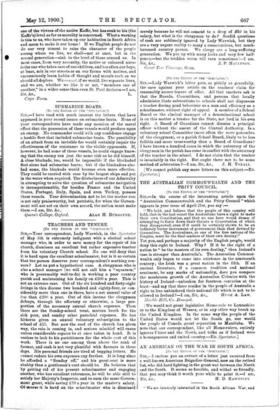TEACHERS AND TENURE.
[TO THE EDITOR OF THE "SPECTATOR.")
Sin,—Your correspondent, Lady Warwick, in the ,Spectator of May 5th is extremely indignant with a clerical school manager who, in order to save money for the repair of his church, dismisses an excellent but rather expensive teacher from his voluntary Church schooL No one will deny that it is hard upon the excellent schoolmaster, bat is it so certain that the parson deserves your correspondent's scathing cen- sure? Let us put a hypothetical case. A clergyman who is also a, school manager (we will not call him a " squarson," who is presumably well-to-do) is working a poor country parish and maintaining his family on £200 a year. This is not an extreme case. Out of the six hundred and forty-eight livings in this diocese two hundred and eighty-four, or con- siderably more than one in three, have a net annual value of less than e200 a year. Out of this income the clergyman defrays, through the offertory or otherwise, a large pro- portion of the necessary annual church expenses. Then there are the Sunday-school treat, mutton broth for the sick poor, and sundry other parochial expenses. He has hitherto given an annual voluntary subscription to the school of £15. But now the roof of the church has given way, the rain is coming in, and serious mischief will ensue unless considerable repairs be at once taken in hand. It is useless to look to his parishioners for the whole cost of this work. There is no one among them above the rank of farmer, and cash is not very plentiful with farmers in these days. His personal friends are tired of begging letters. He cannot reduce his own expenses any farther. It is long since he afforded a "Sunday off," and his great-coat is more shabby than a gentleman's coat should be. He believes that by getting rid of his present schoolmaster and engaging another, who has excellent references, he will be able still to satisfy her Majesty's Inspector, and to earn the same Govern- ment grant, while saving £10 a year in the master's salary. Of course it is hard on the schoolmaster who is dismissed merely because he will not consent to a drop of AO in his salary, but what is the clergyman to do ? Sordid questions of cash are sublimely ignored by Lady Warwick, bat they are a very urgent reality to many a conscientious, but much- harassed country parson. We clergy are a long-suffering generation. We put up with many kicks and very few half- pence,—but the trodden worm will turn sometimes !—I am,






































 Previous page
Previous page